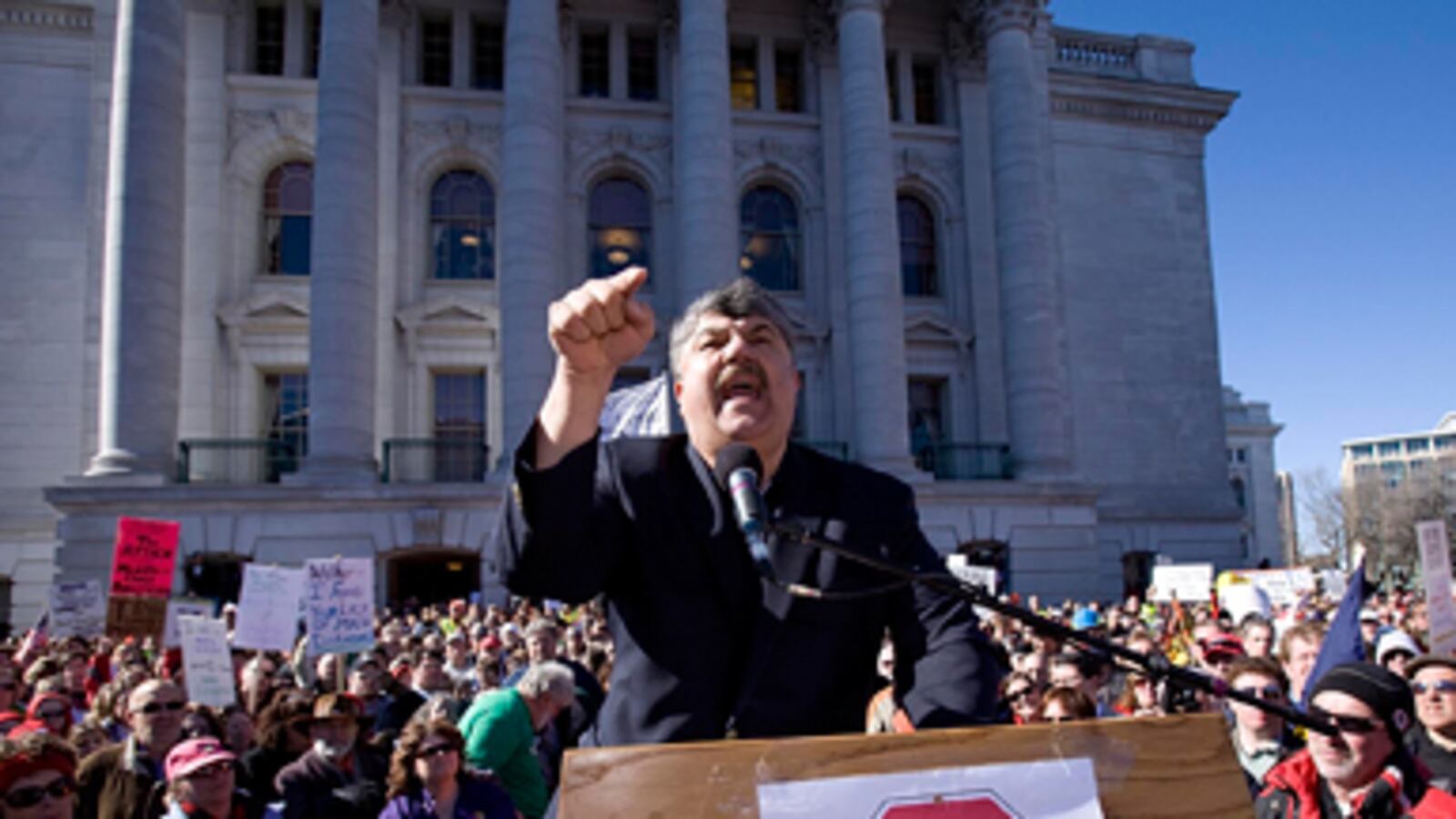Richard L. Trumka has seen his share of strikes and protests, but now as president of the AFL-CIO, his fight for Wisconsin has the scent of a final battle, a last stand for America’s organized labor movement.
If Wisconsin yields to the pressures of Gov. Scott Walker, so might some two dozen other states with collective bargaining rights, conservative analysts predict, and that—they argue—would be good news for the economy. The economy is undeniably in trouble. The governor just unveiled his new budget, which includes more than one billion in painful cuts to education and local government. He added that unless the 14 Senate Democrats who have fled the embattled state “come home” to work with the government on the budget repair bill to boost saving measures, “our schools will face massive layoffs of teachers.” Key to Walker’s newly-laid out emphasis on creative ways to save and boosting the private sector, of course, will be plan to end collective bargaining rights for public workers.

But for labor leaders like Trumka, those rights could spell disaster, both for workers and for the politicians trying to defend public workers. “This is about all Americans having the basic right to use the strength of their numbers to pursue the American dream. This is a crystallizing political moment—we’re already seen from Wisconsin polling that voters think Walker has gone too far,” Trumka tells The Daily Beast.
In the latest New York Times/CBS News survey, Americans opposed weakening the bargaining rights of public employee unions by 60 percent to 33 percent.
Trumka has been inspired by the tens of thousands of protesters who have demonstrated in Madison over the last two weeks. Rallies have also been held across the country, in Columbus, Ohio, Des Moines, Iowa, Montpelier, Vermont, and Little Rock, Arkansas.
Conservative commentators such as Bill O’Reilly say the protests are being stage-managed from the Beltway, not ordinary workers, as Trumka and the unions would like the public to believe. “I don't think it's a stretch to say that President Obama may be behind the scenes in this Wisconsin brawl. It might be he and his guys directing what happens out there,” O'Reilly said on Fox News. (Addressing the National Governors Association on Monday, Obama said it does no good “when public employees are denigrated or vilified or their rights are infringed upon.”) James Sherk, a senior policy analyst at the Heritage Foundation, charged that Trumka has been organizing out-of-state protesters to bolster the numbers in Madison.
Trumka would not comment on Obama’s efforts, but denied charges that the protests are not local: “It is a truly grassroots movement of working people coming together and using the strength of their numbers to protect all middle class workers.”
At the crux of the Madison standoff is government workers saying they will take pay cuts and contribute more for health and pension benefits, while Walker insists that he needs to end collective bargaining rights—for everything but salary—to resolve the state’s financial mess.
For Trumka, this is union busting. For Walker, it’s about balancing the budget of a state he says is broke.
State officials facing their own budget crises across the country are watching closely. If Trumka’s predictions come true—“Politicians who follow the Scott Walker playbook are going to have trouble convincing voters that they're looking for balance”—they may back away from following in the governor’s footsteps. But Sherk predicts that advances made by Walker will embolden other cash-strapped political leaders to pursue a similar, much-needed agenda.
“Walker will certainly win the policy victory,” says Sherk. “And what you see in Wisconsin is likely to spread beyond the state.” While there are 12 states with no collective bargaining requirements, he says, some 25 states allow for comprehensive collective bargaining. The end of collective bargaining in Wisconsin, he says will create more pressure and more opportunities for other states to adopt reforms that will give elected officials control over spending in a budget crunch. “These are tough choices. But at the end of the day shouldn’t the voter representatives be making them?”
No, says Trumka, not if it means sacrificing the middle class to bow to corporate interests. “This is the fight of our lives for the middle class. These governors were elected to create jobs. Instead of creating jobs, governors in Wisconsin, Indiana, New Jersey, and other states are targeting middle class workers and destroying good jobs. We need to be doing more to help the middle class, not less.”
Trumka argues to The Daily Beast that Walker’s campaign is “not about budgets,” given that union members in Wisconsin agreed to make his economic concessions. “This is about undermining workers' freedom to join unions and stand up for a middle class life.” He charges that Walker’s loyalty lies with big business: “One of the things we've learned from Walker and other corporate-backed politicians is that they have no problem eliminating the advocates for working people, but they keep their big business and corporate CEO advocates in power. We've seen that while workers are losing their voice at the workplace, the Koch brothers have direct access to Governor Walker. Wall Street executives and the politicians they finance are taking advantage of the economic mess they created by using this troubled economy as an excuse to attack and weaken working people,” Trumka added.
But conservatives such as Sherk draw a contrast with non-government employees. “Look, it’s a basic matter of fairness and shared sacrifice,” he said. “When the private sector has had to sacrifice so much, why do union members get these protections?”
Trumka will have none of that: “It's deeply disturbing that Governor Walker and his corporate backers are skewing the meaning of shared sacrifice. Shared sacrifice isn't about sacrifice only for the have-nots and the have-even-lesses. Sacrifice should be about Wall Street paying their fair share for the burden they've already placed on working people. Wall Street created the fiscal mess we're facing, yet they are getting even bigger tax breaks. That's not right.”
Andy Stern, a senior fellow at the Georgetown Public Policy Institute and a former president of the Service International Employees Union, has described Walker’s efforts as part of a 15-state GOP power grab. He says Trumka must feel “the weight of the world on his shoulders when it comes to the future of working people—whether they will have a voice or their future will be dictated by big business. The pressure is mounting.”
He says Walker, backed by the billionaire Koch brothers, is making “a power grab as political payback.” But he says their clout is narrowing, with Indiana Gov. Mitch Daniels recently withdrawing his support for an anti-union bill and “other governors seeing how this issue distracts citizens and legislative efforts,” so that “what looked like a joy ride for Governor Walker now looking much more like an obstacle course.”
Public opinion appears to be on Trumka’s side. A poll by the Pew Research Center released Monday found that 42 percent sided with the Wisconsin unions and 31 percent with Walker. A USA Today poll found 61 percent would oppose a law in their own state similar to Walker’s proposal, with only 33 percent in support of such a change. In the latest New York Times/CBS News survey, Americans opposed weakening the bargaining rights of public employee unions by 60 percent to 33 percent.
But budget hawks say some states are facing massive pension shortfalls. American Enterprise Institute scholar Andrew Biggs, a former Social Security official, says Obama’s ability to support local public unions is limited. “In the federal government there is no collective bargaining on wages or benefits [except for the Post Office], so it is hard for Obama to go to the mat for something federal workers don’t have,” says Biggs.
Eve Conant is a Newsweek staff reporter covering immigration, politics, social, and culture issues.





